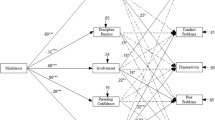Abstract
Parenting preschoolers can be a challenging endeavor. Yet anecdotal observations indicate that parents who are more mindful may have greater ease in contending with the emotional demands of parenting than parents who are less mindful. Therefore, we hypothesized that parenting effort, defined as the energy involved in deciding on the most effective way to respond to a preschooler, would be negatively associated with mothers’ mindfulness. In this study, a new parenting effort scale and an established mindfulness scale were distributed to 50 mothers of preschoolers. Using exploratory factor analysis, the factor structure of the new parenting effort scale was examined and the scale was refined. Bivariate correlations were then conducted on this new Parenting Effort—Preschool scale and the established mindfulness scale. Results confirmed the hypothesis that a negative correlation exists between these two variables. Implications are that mindfulness practices may have the potential to alleviate some of the challenges of parenting preschoolers.
Similar content being viewed by others
References
Bluth, K., & Wahler, R. (2011). Does effort matter in mindful parenting? Mindfulness, 2, 175–178, doi:10.1007/s12671-011-0056-3.
Bluth, K., Williams, K. L., & Wahler, R. (2010). Parenting effort scale. Unpublished scale. Psychology. University of Tennessee at Knoxville. Knoxville.
Brown, K., & Ryan, R. (2003). The benefits of being present: Mindfulness and its role in psychological well-being. Journal of Personality and Social Psychology, 84(4), 822–848. doi:10.1037/0022-3514.84.4.822.
Coatsworth, J. D., Duncan, L. G., Greenberg, M. T., & Nix, R. L. (2009). Changing parent’s mindfulness, child management skills and relationship quality with their youth: Results from a randomized pilot intervention trial. Journal of Child and Family Studies, 19(2), 203–217. doi:10.1007/s10826-009-9304-8.
Dumas, J. (2005). Mindfulness-based parent training: strategies to lessen the grip of automaticity in families with disruptive children. Journal of Clinical Child and Adolescent Psychology, 34(4), 779–791. doi:10.1207/s15374424jccp3404_20.
Duncan, L. G., Coatsworth, J. D., & Greenberg, M. T. (2009). A model of mindful parenting: Implications for parent–child relationships and prevention research. Clinical Child and Family Psychology Review, 12(3), 255–270. doi:10.1007/s10567-009-0046-3.
Kabat-Zinn, J. (1990). Full catastrophe living. New York: Random House.
Kabat-Zinn, J. (1994). Wherever you go, there you are: Mindfulness in everyday life. New York: Hyperion.
Muthén, L. K., & Muthén, B. O. (2004). MPlus user’s guide (3rd ed.). Los Angeles: Author.
Singh, N., Lancioni, G. E., Winton, A. S. W., Singh, J., Singh, A. N., Adkins, A. D., et al. (2010). Training in mindful caregiving transfers to parent–child interactions. Journal of Child and Family Studies, 19(2), 167–174. doi:10.1007/s10826-009-9267-9.
Author information
Authors and Affiliations
Corresponding author
Appendix A
Appendix A
Parenting Effort Scale—Preschool (PES-PS)
-
1.
I find it hard to think when my child is upset.
-
2.
Listening to my child’s view of a problem comes easy for me.
-
3.
When I see the look on my child’s face, I can usually figure out what it means.
-
4.
I am often indecisive when my child opposes my instructions.
-
5.
When my child comes home from school, it takes time for me to reconnect to her/him.
-
6.
Parenting my child takes up more time than it should.
-
7.
When my child starts talking to me, I immediately know what’s on her/his mind.
-
8.
I keep wondering what my child thinks about me.
-
9.
When my child and I have an argument it’s hard for me to get back on track as a parent.
Rights and permissions
About this article
Cite this article
Bluth, K., Wahler, R.G. Parenting Preschoolers: Can Mindfulness Help?. Mindfulness 2, 282–285 (2011). https://doi.org/10.1007/s12671-011-0071-4
Published:
Issue Date:
DOI: https://doi.org/10.1007/s12671-011-0071-4




